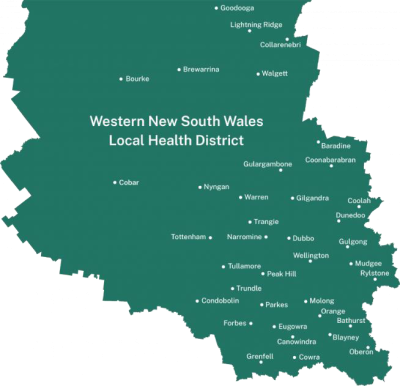Request accessible format of this publication.
Innovate Reconciliation Action Plan background

On this page
Our business
Western NSW is a large, geographically diverse region covering approximately 31% of NSW with nine Aboriginal nations. It has a widely dispersed population living in regional centres, and small rural and remote communities.
Western NSW has one of the most rural and vulnerable populations in NSW. This is reflected in lower life expectancy, more avoidable deaths, and higher rates of cancer, cardiovascular disease, and diabetes, compared with the NSW population, especially for Aboriginal and Torres Strait Islander people1.
In 2017, life expectancy at birth for Aboriginal and Torres Strait Islander males was 70.9 years (non–Indigenous males was 80.2 years), and for Aboriginal and Torres Strait Islander females was 75.9 years (non–Indigenous females was 83.3 years)2, with a chronic kidney disease and
mental-behavioural hospitalisation rate at least 2 times higher than non-Indigenous people.
WNSWLHD provides services across the continuum of care, from rural referral hospitals to community and primary care services.
The district has 38 inpatient facilities, including three rural referral hospitals, four procedural hospitals, six community hospitals, and 25 multipurpose services.
In addition, WNSWLHD offers community health centres, community mental health services, and inpatient mental health drug and alcohol units.
As the district with the largest proportion of Aboriginal and Torres Strait Islander people in NSW, WNSWLHD is committed to providing comprehensive health and wellbeing services to all residents, including those living in regional centres and small rural and remote communities.
Our services are tailored to meet the diverse needs of our community and aim to reduce health disparities and improve health outcomes for all.
Our workforce
Aboriginal and Torres Strait Islander people bring many strengths to the health sector. They bring a specialised skill set of cultural and spiritual knowledge, connection to community based on lived experience, resilience, and family and cultural values that enable them to be valued as trusted role models and leaders in their professional field.
These workers often have historical understanding as well as current and timely knowledge of the relationships among community members. This brings a unique and critical link that enables them to carry out the dual responsibility of working in a Western medical model which is also bridged to a holistic health model that is intertwined with cultural and social obligations.
WNSWLHD currently has a workforce of 7458 staff, including employees and visiting medical and dental officers. 517 (6.93%) of staff identify as Aboriginal.
Through these attributes, Aboriginal and Torres Strait Islander staff have identified they are able to heal in two ways - through their professional fields of expertise, and by acknowledging and addressing the impacts of transgenerational trauma and respecting cultural health beliefs.
Aboriginal Health Workers have been employed across the WNSWLHD for many years and have provided services to Aboriginal and Torres Strait Islander patients, families and communities that are holistic, best practice and are performed in a manner that is relevant and appropriate for the community in which they practice. They are the key to improving access to mainstream health services and can greatly improve the health outcomes of Aboriginal and Torres Strait Islander patients and families.
“The Aboriginal Health Worker works as a key member of the multi-disciplinary team, providing flexible primary health care services to Aboriginal and or Torres Strait Islander people and community including activities in response to their holistic and cultural needs, to achieve better health access and outcomes”. “These roles are non-clinical and provide a variety of services in a community and/or hospital setting. These services include advocacy, support, liaison, and health promotion”.5
“Australian Health Practitioner Regulation Agency (AHPRA) registered Aboriginal Health Practitioners (protected Title) work as part of a multidisciplinary team and are responsible for the delivery of culturally safe and high-quality direct clinical services in a variety of clinical settings including direct patient care, care planning and coordination, health promotion, screening and prevention and education”.5
Our District’s vision, purpose and values
Our vision is to work towards and create healthier rural people and thriving communities across the area we serve, by providing exceptional health care based on our values of Collaboration, Openness, Respect and Empowerment.
Our District’s vision, purpose and values are set out in our Strategic Plan 2020 – 2025.
We recognise the disparity in health outcomes between Aboriginal and Torres Strait Islander people and non–Indigenous people and our key role in overcoming this gap.
Our strategic goal to make Meaningful Gains in Aboriginal Health describes the strategies we will deliver and the outcomes we are working towards.
